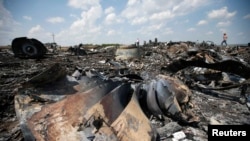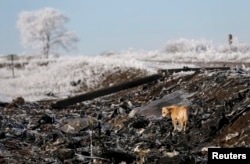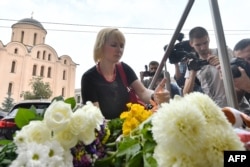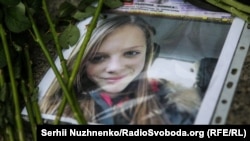On Thursday, March 28, the Russian state media agency Sputnik put out a new narrative on the downing of Malaysian Airlines flight MH17 over eastern Ukraine in July 2014, which killed all 298 people on board.
Sputnik cited a source “familiar with the situation” who pinned the blame on Ukraine for not closing its airspace following Russia’s clandestine military intervention earlier that year.
"Russia supports the Netherlands in its commitment to the search for truth, justice and those responsible for the crash of MH17, But… one has to admit that at the moment the main responsible party is still the state that failed to close its airspace," the source was quoted as saying.
The source further told Sputnik that justice could be guaranteed via the “honest and impartial work of the Joint Investigation Team, which has to take into account all data that can help the probe, including the data that comes from the parties that are not part of the JIT."
Sputnik cited a Russian Foreign Ministry statement claiming the BUK TELAR surface-to-air missile which downed MH17 had been decommissioned by Russia well before the shoot-down.
This, along with the claim naming Ukraine as responsible for downing the civilian airliner, is false.
On May 24, 2018, the Dutch JIT presented its findings on the system that shot down MH17, which was en route from Amsterdam to Kuala Lumpur. The JIT determined the missile system had been provided from Russia and identified the military unit it belonged to – the Russian armed forces’ 53rd anti-aircraft missile brigade.
The next day, the governments of Australia and the Netherlands officially declared that they were holding Russia responsible for the incident, which claimed many Dutch and Australian nationals among the victims.
Shortly thereafter, the independent Russian newspaper Novaya Gazeta published a letter, from families of MH-17 victims, that cited some of the Kremlin’s alternative explanations for the plane’s downing, including:
- “MH17 was shot down by a Ukrainian jet.”
- “It was blown up by a missile intended for the Russian President’s plane.”
- “It was already full of dead bodies and deliberately crashed.”
- “It was shot down by a BUK missile but not one of Russia’s.”
Aric Toler of the investigative group Bellingcat has published an extensive list of the Kremlin’s “self-contradicting” narratives on the matter.
While Russian state media continue to spin alternative theories of what happened to MH17, parties to the Russian conflict in Ukraine have apparently let information on the matter slip.
For example, a social media account associated with Igor “Strelkov” Girkin, a Russian citizen and commander of “rebel” forces in the Donbas, bragged about downing a Ukrainian military An-26 cargo plane in the vicinity of MH17’s crash site. The post showed photos of a rising column of smoke and a warning to the Ukrainian military to “stay out of our sky.”
Once it became clear that it was MH17 and not an An-26 which had been shot down, the post disappeared, and the alternative theories began. However, Russian state media cited the post in initial stories about the downing of a Ukrainian An-26, and some of those pieces are still online today.
But what about Ukraine’s culpability for not closing its airspace.
That issue is open to debate.
In October 2015, the Dutch Safety Board found that Ukraine should have closed its airspace, as two Ukrainian military planes had been hit while flying at altitudes used by airliners.
Ukraine’s Foreign Minister Pavlo Klimkin defended the country’s decision to leave its airspace open.
“No one at this time ... was even aware of the presence of highly sophisticated anti-air missile capabilities,” Reuters quoted Klimkin as saying. “No-one at the time had any kind of awareness of such a threat ... everyone was absolutely sure it was about purely conventional weapons.”
Despite the claim by Sputnik’s source that Russia was committed to justice in the matter, in July 2015 Russia vetoed a United Nations Security Council draft resolution that would have set up an international tribunal to prosecute those responsible for shooting down MH17.
Russia proposed its own draft resolution that demanded justice for those behind the downing of the airliner but opposed a criminal tribunal.
And while there are valid arguments to be made that Ukraine should have closed its airspace, to hold Kyiv, and not the actual culprits, responsible for the plane’s downing, is specious.
Polygraph.info therefore finds Sputnik’s claims to be false.



